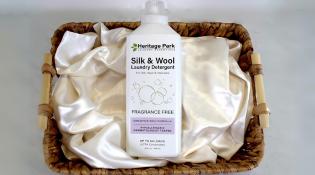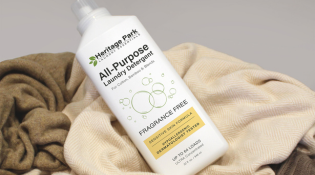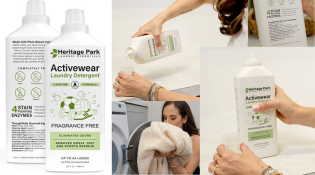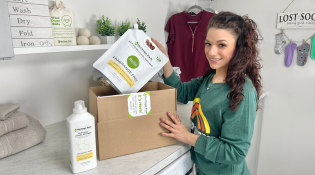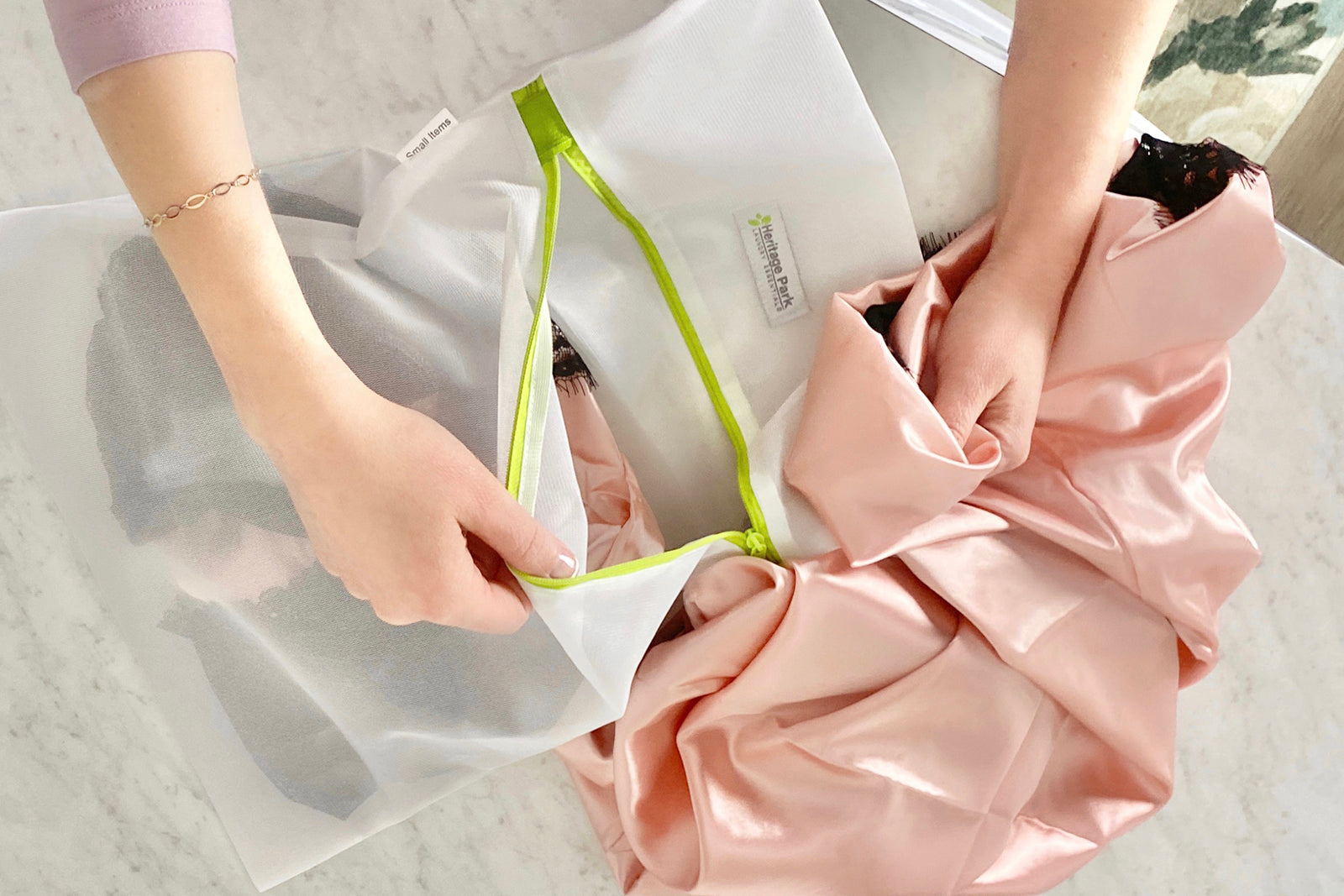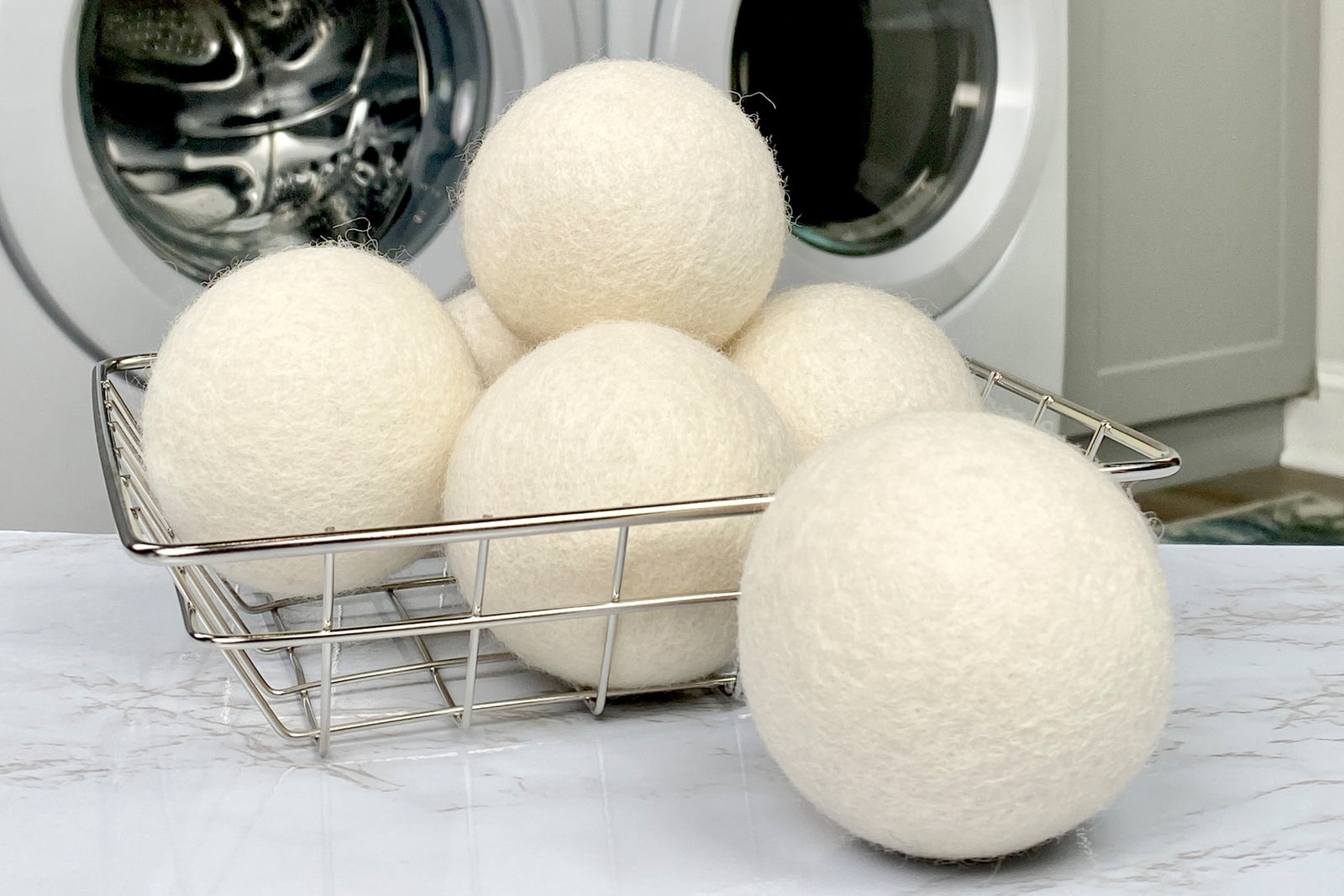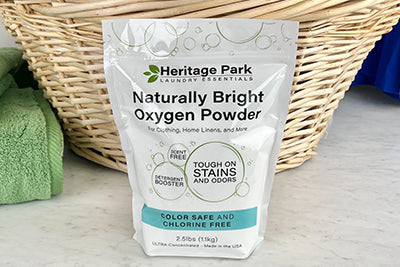This comprehensive guide outlines a sensitive skin laundry routine, offering gentle washing tips to help people with eczema, dermatitis, and skin allergies create a safe, irritation-free laundry system.
Key Takeaways
|
Why Your Laundry Routine Matters for Sensitive Skin
Managing sensitive skin, eczema, atopic dermatitis, or contact dermatitis means paying attention to everything that touches your body -- including the clothes you wear and the bedding you sleep on. People with sensitive skin often experience symptoms like itching, redness, irritation, and compromised skin barrier function. Choosing the best, non-irritating laundry detergent, like Heritage Park All-Purpose Fragrance Free, is essential for any skin type. But creating a truly skin-safe laundry routine requires a comprehensive approach that addresses every step of the washing and drying process.
How Laundry Irritants Trigger Skin Reactions
For those with dry skin, skin sensitivity, or chronic skin conditions, even minor irritants can trigger uncomfortable skin reactions. If you're ready to transform your laundry routine to protect your delicate skin and prevent contact dermatitis flare-ups, this guide will walk you through our protocol of sensitive skin laundry tips. From washing machine settings to drying techniques, you'll learn how to wash clothes for sensitive skin while maintaining effective cleaning power and supporting your skin care routine.

Choosing the Best Laundry Detergent for Sensitive Skin
Before diving into washing techniques, your sensitive skin laundry routine must start with the right detergent. For people with sensitive skin, atopic dermatitis, or other skin conditions, Heritage Park All-Purpose Fragrance-Free Laundry Detergent is the ideal first step for your gentle washing routine:
- Independently lab-certified hypoallergenic with zero adverse reactions in clinical testing
- EWG VERIFIED® to meet the strictest standards for ingredient safety (Heritage Park All-Purpose Fragrance Free and Heritage Park Silk and Wool Fragrance Free)
- Formulated without harsh chemicals, dyes, artificial fragrance, sulfates, or optical brighteners that can trigger allergic reactions
- pH-neutral to work in harmony with your skin's natural chemistry and barrier function
- Powered by five enzymes for effective stain removal without irritating ingredients
- Plant-based and made with natural and naturally sourced ingredients that won't compromise sensitive skin
Unlike traditional detergents that can cause skin irritation, redness, and dermatitis, Heritage Park's gentle formula supports your skin care goals while delivering superior cleaning power. With the right detergent as your starting point, you can build a complete laundry system that protects sensitive skin while keeping clothes fresh and clean.
Step-by-Step Sensitive Skin Laundry Routine
1. Pre-Washing Preparation
Start by Reading Care Labels. Always follow garment care instructions, especially for new clothes. Washing new clothes before wearing is essential, as manufacturing chemicals and sizing agents can trigger skin reactions and contact dermatitis in people with sensitive skin.
Sort Carefully. Separate clothes not just by color, but by fabric type and soil level. For those with skin sensitivity, heavily soiled items may need extra rinse cycles, while delicate fabrics require gentler treatment regardless of how dirty they are. Definitely wash items like undergarments separately from dirty or sweaty items like work clothes or athletic wear to prevent cross-contamination of irritants.
Check Pockets and Pre-Treat Stains. Remove all items from pockets to prevent damage to both clothes and washing machine. For stains, avoid harsh stain removers that can leave irritating residue and cause skin irritation. Instead, use a 1:1 blend of Heritage Park All-Purpose Detergent and water in a spray bottle as a gentle pre-treatment. You can also use the detergent directly on the stain.
2. Best Washing Machine Settings for Sensitive Skin
Water Temperature. Cool to Warm Hot water can strip natural oils from fabrics and degrade their quality, which can make clothes and sheets rougher and more irritating to sensitive skin. Cool to warm water (60-80°F) effectively cleans most laundry while being gentler on sensitive skin and preventing dryness. Reserve hot water only for sanitizing items during illness or for heavily soiled bedding when dealing with severe eczema or dermatitis flare-ups.

Cycle Selection. Choose longer, gentler cycles over quick wash options. The extended washing time with more water changes helps ensure thorough cleaning and complete detergent removal -- crucial for preventing skin irritation and maintaining skin barrier function. Use the "sensitive" or "extra rinse" setting if your washing machine offers it.
Load Size. Avoid overpacking your washing machine. Clothes need room to move freely for proper cleaning and rinsing. Overcrowded loads can trap detergent residue and reduce cleaning effectiveness, potentially leaving irritants that can trigger skin reactions.
3. Double Rinse Benefits for Sensitive Skin Laundry
One of the most important sensitive skin laundry tips is incorporating an extra rinse cycle. This second rinse ensures complete removal of detergent residue, soap scum, and any remaining irritants that could cause skin irritation or contact dermatitis. While Heritage Park's gentle formula rinses away easily, the extra rinse provides additional peace of mind for highly sensitive skin types.
When to Always Double Rinse:
- First few loads when switching to a new detergent
- Baby clothes and bedding for sensitive skin protection
- Items worn next to skin (underwear, pajamas, sheets)
- After washing heavily soiled items that may contain irritants
- If you live in an area with hard water that contains minerals that can irritate skin
Measuring Detergent Correctly
More detergent doesn't mean cleaner clothes -- it often means more residue left behind that can irritate sensitive skin and compromise barrier function. Follow the concentration guidelines on your detergent bottle, adjusting for load size and soil level. Heritage Park's concentrated formula means a little goes a long way, reducing the risk of residue while maintaining cleaning power for all skin types.
What to Avoid in Your Sensitive Skin Laundry Routine
Why Sensitive Skin Should Skip Fabric Softeners
Fabric softeners and dryer sheets contain numerous chemicals and artificial fragrances that can irritate sensitive skin and trigger allergic reactions. They also leave a waxy coating on fabrics that can trap irritants and reduce absorbency, potentially worsening eczema, atopic dermatitis, and other skin conditions. Instead, try these natural alternatives:
- Wool Dryer Balls: Our natural wool dryer balls soften clothes without chemicals while reducing drying time and preventing skin irritation
- White Vinegar: Add 1/2 cup to the rinse cycle as a natural fabric softener (the smell disappears when dry) without triggering skin sensitivity
- Proper Detergent: High-quality detergents like Heritage Park naturally leave clothes softer without additional products that could compromise your skin barrier
Avoid Harsh Stain Removers
Commercial stain removers often contain aggressive chemicals that can remain in fabric fibers even after washing and cause contact dermatitis or other skin reactions. Instead, pre-treat stains with your gentle detergent or create a paste with detergent and water for stubborn spots to protect sensitive skin.
Don't Use Bleach or Optical Brighteners
These harsh chemicals can severely irritate sensitive skin, cause redness and dermatitis, and damage fabric over time. Heritage Park's enzyme formula naturally brightens whites and colors without harsh bleaching agents that can trigger skin sensitivity and allergic reactions.
Laundry Drying Techniques for Sensitive Skin
Air drying is often better for sensitive skin than machine drying. If you're using a dryer, follow these guidelines. When using a dryer for sensitive skin care do the following:
- Use the lowest heat setting that effectively dries your clothes to prevent skin irritation from overheated fabrics
- Remove clothes while slightly damp to prevent over-drying and stiffness that can worsen eczema and dermatitis symptoms
- Clean the lint filter before every load to improve airflow
- Consider using wool dryer balls instead of dryer sheets to avoid artificial fragrances and chemicals that trigger skin reactions
Sensitive Skin Laundry Tips for Different Conditions
Eczema-Prone Skin |
Wash bedding weekly in hot water (130°F) to eliminate dust mites that can worsen eczema symptoms Consider washing pillowcases twice weekly to reduce contact dermatitis triggers Use only hypoallergenic detergents like Heritage Park that support skin barrier function Avoid fabric softeners completely as they can exacerbate eczema and atopic dermatitis |
Contact Dermatitis |
Always wash new clothes before wearing to prevent skin reactions from manufacturing chemicals Double rinse all items that touch skin directly to eliminate potential irritants Be especially careful with athletic wear, which can trap sweat and detergent residue that may trigger contact dermatitis |
Atopic Dermatitis and Seborrheic Dermatitis |
Use fragrance-free products exclusively to prevent skin irritation Wash items in cool water to avoid triggering sensitivity Consider hypoallergenic laundry products that won't compromise skin barrier function |
Baby and Toddler Laundry |
Wash baby clothes separately from heavily soiled adult items to protect developing skin barriers Use only dermatologist and pediatrician-tested detergents safe for the most sensitive skin types Avoid all fragrances, dyes, and fabric softeners that can cause skin reactions in infants Consider washing baby items twice for extra gentleness and complete irritant removal |
Build Your Complete Skin-Safe Laundry Routine with Heritage Park
Creating an effective sensitive skin laundry routine requires attention to every detail, from the detergent you choose to how you dry your clothes. For people dealing with eczema, contact dermatitis, atopic dermatitis, or general skin sensitivity, following these sensitive skin laundry tips and building habits around gentle washing practices can significantly reduce skin irritation, redness, itching, and other uncomfortable symptoms while creating a truly skin-safe environment.
Understanding your skin type and specific skin conditions helps you customize this routine for maximum benefit. Remember, the foundation of any successful sensitive skin laundry routine starts with the right detergent. Heritage Park's dermatologist-tested, EWG-verified formula provides the gentle yet effective cleaning power you need for sensitive skin care, while these routine adjustments ensure optimal results for your sensitive skin and barrier function. As always, the Heritage Park team is here to answer questions about our products and how we can support your efforts to protect sensitive skin.
Frequently Asked Questions
How do I know if I have sensitive skin?
Sensitive skin symptoms include redness and inflammation; rashes or hives; itchy skin; bumps or blisters; dryness and flaking; swelling; stinging or tingling; changes in skin texture. Watch for these reactions after exposure to soap, laundry detergent, shampoo, or a new skincare product.
Should I double rinse clothes for sensitive skin?
Yes, especially when first switching to a new detergent, washing baby clothes, or dealing with heavily soiled items. The extra rinse ensures complete removal of detergent residue and irritants that could trigger skin reactions or contact dermatitis.
Is hot water bad for eczema?
Hot water for washing clothes isn't necessarily bad for eczema, but it's often unnecessary. Cool to warm water cleans effectively while being gentler on fabrics and preventing skin irritation. Reserve hot water for sanitizing bedding during flare-ups or illness when dealing with severe atopic dermatitis symptoms.
What are the best laundry cycle settings for sensitive skin?
Choose longer, gentler cycles with extra rinse options to prevent skin irritation and maintain barrier function. Avoid quick wash cycles, which don't provide adequate rinsing time. The "delicate" or "sensitive" setting works well for most loads and skin types.
I like the smell of fabric softener, what should I do?
Fabric softeners and dryer sheets are heavily fragranced and leave a waxy coating on laundry, both of which can irritate sensitive skin and trigger allergic reactions or contact dermatitis. (They are also terrible for laundry, and can make your items dingy over time, especially towels). Avoid fabric softeners and dryer sheets entirely and use natural alternatives like wool dryer balls to protect your skin barrier.
Should I wash baby clothes separately from adult clothes?
Yes, especially separating baby items from heavily soiled adult clothing to protect developing sensitive skin. Baby clothes can be washed with lightly soiled adult items using the same gentle detergent and extra rinse cycle to prevent skin irritation.
How do I strip allergens from laundry?
This is an instance when using hot water (if fabric allows) can be ok. If your clothing, bedding or towels are covered in pollen or dust that could trigger skin sensitivity, use warm to hot water and a gentle, effective detergent like Heritage Park. Always use an extra rinse cycle. For severe allergies or skin conditions like eczema and dermatitis, consider washing items twice.
Should I avoid fabric softeners with sensitive skin?
Absolutely. Fabric softeners contain artificial fragrances and chemicals that commonly trigger skin reactions, redness, and dermatitis. Natural alternatives work better for sensitive skin and skin care and prevent an allergic reaction.
Is air drying better for eczema-prone skin?
Air drying can be better because it is gentler on fabric fibers that could irritate eczema or atopic dermatitis. However, proper machine drying with wool dryer balls is also fine for sensitive skin.
Should I wash new clothes before wearing them?
Always wash new clothes before wearing. Manufacturing chemicals, dyes, and sizing agents used in production can trigger skin reactions, contact dermatitis, and other skin conditions in sensitive individuals.
What are the best dryer balls for sensitive skin laundry?
Heritage Park's wool dryer balls are ideal for sensitive skin types. They're chemical-free, hypoallergenic, and naturally soften clothes while reducing drying time without triggering skin sensitivity or allergic reactions.
What's the difference between natural and chemical-free laundry tips?
Natural laundry approaches use plant-based ingredients and gentle methods that support skin barrier function, while chemical-free focuses on avoiding synthetic additives that can cause skin irritation. The best approach combines both: natural ingredients like those in Heritage Park with chemical-free practices like skipping fabric softeners to protect sensitive skin and prevent dermatitis.
Q: Can you provide a simple-to-follow laundry protocol checklist for individuals with sensitive skin?
Yes! Below is a checklist you can follow to help limit flare-ups for individuals with skin sensitivities.
Laundry Protocol for Sensitive Skin
Before Washing
- Sort by fabric type and soil level to prevent skin irritation
- Check and empty all pockets
- Pre-treat stains with gentle detergent to avoid harsh chemicals
- Wash new clothes before first wear to prevent contact dermatitis
During Washing
- Use Heritage Park Fragrance-Free detergent for sensitive skin protection
- Select appropriate water temperature (cool to warm) to prevent skin irritation
- Choose longer, gentler cycle to support skin barrier function
- Don't overload the washing machine
- Add extra rinse cycle to remove all irritants
Drying Process
- Skip fabric softeners and dryer sheets to prevent allergic reactions
- Use wool dryer balls if machine drying for sensitive skin care
- Select lowest effective heat setting to avoid skin irritation
- Remove clothes while slightly damp to prevent roughness that could worsen eczema
- Consider air drying when possible for maximum skin sensitivity protection
Weekly Tasks
- Clean lint filter
- Wash bedding in hot water for dust mite control to prevent eczema flare-ups
- Check detergent supply for consistent sensitive skin care


